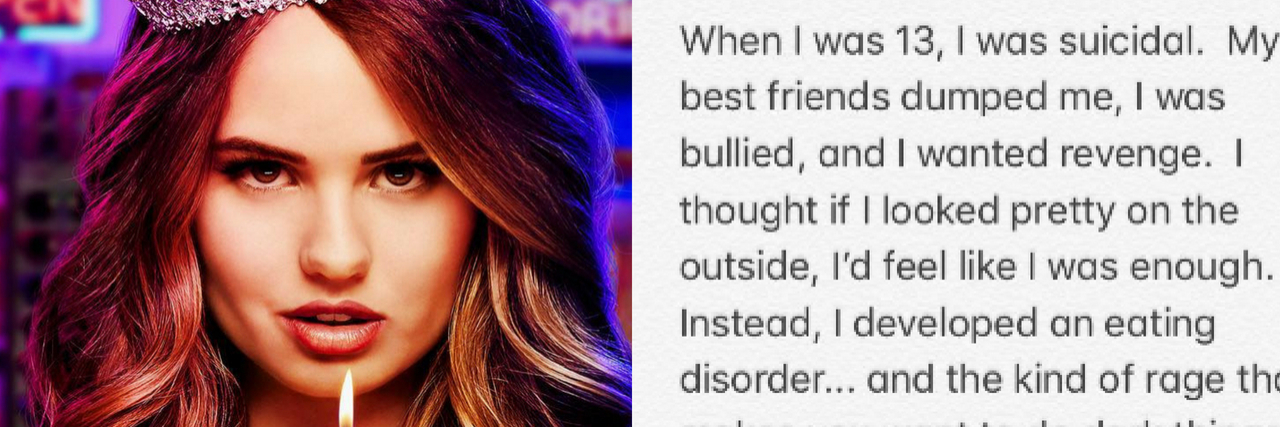From the moment its trailer was released, the new Netflix show “Insatiable” started a heated discussion. For many, the storyline itself was problematic: a “former fatty” gets an opportunity to seek revenge after a summer with her mouth wired shut leaves her skinny. In the trailer, actor Debby Ryan wears a fat suit, and although the show’s stars like Ryan and Alyssa Mallano have defended the premise by saying it’s satire, this explanation wasn’t satisfying for many.
Fat suits are:
❌ Never necessary
❌ An excuse to give fat roles to thin actors
❌ Almost always part of a story about living a life you can lead at any size
❌ Often promote a regressive understanding of fat people/wt loss
❌ Harmful to fat people and people w/ eating disorders— Your Fat Friend (@yrfatfriend) July 22, 2018
fat girls are not your before. fat girls are not your torture porn. fat girls are so much more than whatever the fuck this bullshit is @netflix @insatiable_
— mermaid queen ????????♀️ (@MerQueenJude) July 19, 2018
A Change.org petition to cancel the show already has 101,000 signatures.
On Friday, the show’s creator and executive producer Lauren Gussis took to Twitter to respond to the backlash. With the caption, “This is my truth,” she wrote:
When I was 13, I was suicidal. My best friend dumped me, I was bullied, and I wanted revenge. I thought if I looked pretty on the outside, I’d feel like I was enough. Instead, I developed an eating disorder… and the kind of rage that makes you want to do dark things .
I’m still not comfortable in my skin… but I’m trying to share my insides — to share my pain and vulnerability through humor. That’s just my way.
This show is a cautionary tale about how damaging it can be to believe the outsides are more important — to judge without going deeper. Please give the show a chance.
This is my truth. @insatiable_ pic.twitter.com/xbs3YtueCQ
— Lauren Gussis (@GussisLauren) July 21, 2018
Many were sympathetic to Gussis’ personal story, but others pointed out her note didn’t clarify why the main character is teased for being fat — and only seeks revenge when she’s skinny. One Twitter user asked, “I’m so sorry you went through that. It sounds hard and no one deserves bullying. Having an eating disorder isn’t the same thing as being fat, though, and so far you’ve ignored my question about whether or not you were mocked for your weight. Can you clarify?”
posts & writings about personal ED experiences
no matter how true, genuine, earnestdo not have a free pass to be fatmisic in their textual message
— tommy (@tommyinboots) July 15, 2018
I do want to say that I acknowledge and respect your struggle. I can relate to it on a personal level too. But, based on the advertising and directorial style (from what we can see), this show has the utmost potential to damage and negatively influence
— Helena Brown (@HelenaBsings) July 21, 2018
I’m so sorry you went through that. It sounds hard and no one deserves bullying. Having an eating disorder isn’t the same thing as being fat, though, and so far you’ve ignored my question about whether or not you were mocked for your weight. Can you clarify?
— Jezebel Express (@jezebelexpress) July 21, 2018
Now that I know the story behind it, I'm willing to give the show a shot. I thought it was the stereotypical cliched girl gets skinny and so on, but from your statement it seems to explore more than that. I hope it does.
— Mariah Ramsey (3000) (@TheMariahRamsey) July 21, 2018
I never ever everrrrrr want to discredit someone’s lived experiences or judge someone’s body positivity journey but when the show is about someone who undergoes WEIGHT LOSS and is only then able to take up space/ gain respect/ take “revenge” or be heard, it sends a completely
— ???????????????????????? (@TheBiancanator) July 21, 2018
Similarly, Ryan released a statement citing her own struggle with body image. “We’re not in the business of fat shaming,” she wrote, “We’re out to turn a sharp eye on broken, harmful systems that equate thinness with worth.”
— debbyryan (@DebbyRyan) July 21, 2018
Update Jul. 30 5:56 a.m. PST: Netflix’s Original Series vice-president Cindy Holland responding toe the backlash at the 2018 Television Critics Association Summer Press Tour. She said:
Lauren Gussis, who is the creator, felt very strongly about exploring these issues based on her own experiences, but in a satirical, over-the-top way,” she said. “Ultimately, the message of the show is that what is most important is that you feel comfortable in your own self. Fat-shaming itself, that criticism, is embedded in the DNA of the show.
What do you think?

